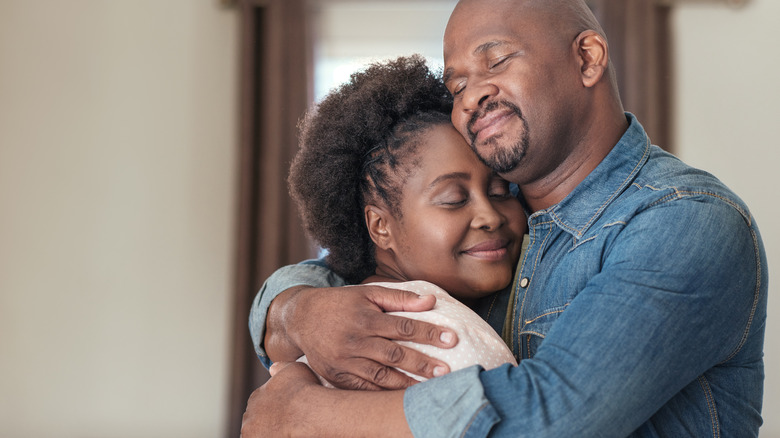Dispelling 9 Myths About Trauma Bonding To Define Exactly What It Is - Exclusive
The concept of trauma bonding has been thoroughly studied by International Institute for Trauma and Addiction Professionals founder Patrick Carnes. By his own definition in his original research, the term is a way of describing "dysfunctional attachments that occur in the presence of danger, shame, or exploitation." But, today, there are a number of myths surrounding the concept, with what it really means sometimes getting pretty misconstrued.
In fact, in some circles, the concept sometimes actually has positive connotations when it comes to romantic relationships and friendships. But it's imperative to recognize the difference between trauma bonding and bonding over shared trauma, because the two are not the same thing. Bonding over shared trauma refers to two or more people who are there for one another because they've experienced the same tough situation. Trauma bonding is not that.
To find out more about what trauma bonding actually involves, Women.com spoke exclusively with licensed psychologist Dr. Carolyn Rubenstein, PhD.
Trauma bonding actually isn't about shared trauma
Although there's a misconception that trauma bonding happens between two people who have been through something traumatic and are helping each other move past it, that's just not true. "Because we tend to think of bonding as beneficial and romantic love as transcendent, we don't understand the prevalence of trauma bonds in modern-day," Nadine Macaluso, LMFT, explained to MBGRelationships. In fact, some people may even consider the moments of heated passion and closeness that often rears its head in these kinds of situations as romantic. But it is not.
In reality, the concept involves one person in a relationship taking advantage of the other. "There is an intense connection due to the fact that there is a strong hormonal connection between the abuser and the victim," Jimanekia Eborn, a sex educator who specializes in trauma, explained to Well + Good. "The feeling is that you need the other person in order to survive."
Dr. Carolyn Rubenstein told Women.com that being in such a relationship comes with several serious risks and most definitely is not a way of helping anyone heal. There are dangers that can stem from being in a trauma-bonding relationship (which is classed as an abusive relationship). These include physical and emotional harm and a feeling of hopelessness like you just can't break free from this person.
Trauma bonding isn't something to aspire to
Trauma bonding is not something to aspire to and not something that makes relationships stronger. In fact, it usually happens in abusive relationships when the brain experiences a chemical imbalance. "The belief that a trauma bond makes the connection stronger is a myth and one that is very harmful to perpetuate since it keeps people in these unhealthy relationships," Dr. Carolyn Rubenstein explained to Women.
Relationship, intimacy, and sex therapist Claudia Johnson also noted to Cosmopolitan that trauma bonding is usually about one person gaining power over the other. In romantic relationships and friendships, it's almost never about an actual healthy shared love or respect for one another. "For the person experiencing the abuse, their sense of love and caring is tied to the abuse — the verbal, the physical, or the emotional patterns," Johnson explained. One of the most notable examples is probably love bombing, where one person showers love and affection on the other and then dramatically takes it away for no reason.
Licensed marriage and family therapist Nadine Macaluso noted to MBGRelationships that this form of abuse is often done deliberately to keep the other person feeling downtrodden and unable to leave. "A trauma bond occurs when your partner intentionally harms you through a pattern of threats, intimidation, manipulation, deceit, or betrayal so they have power and control," Macaluso said. "You stay loyal to your violating partner despite feelings of fear, emotional pain, and distress."
Trauma bonding relationships aren't all about lows
Despite how it may sound, trauma bonding isn't actually about having only low and destructive moments. In fact, part of the cycle involves having some very positive times. This is why so many people are in too deep when it comes to abusive experiences — because they want to hold on to those good moments. Dr. Carolyn Rubenstein explained exclusively to Women that trauma bonding is all about that up-and-down cycle of abuse. "When the abuse is cyclical and tends to have highs and lows, it can feel incredibly emotionally intense. The periods of highs are confusing and can make the partner begin to doubt their own judgment about the abuser," she shared.
Notably, these kinds of relationships can often have long periods of feeling very close to one another. But they're then followed by the feeling of intense distance that can make the person long for those good times again and make them willing to do anything to get them back. "This can create a sense of uncertainty and instability," she said.
Dr. Liz Powell, a licensed psychologist, shared a similar definition with Well + Good. She explained that in a trauma-bonding relationship, "[There's] a lot of really terrible stuff happening and then occasionally really great stuff happening."
You can't always fix a trauma bond on your own
Some common misconceptions include that trauma bonding isn't that serious and is something you could easily fix alone. However, it may actually require external help to really ensure those susceptible can really become free. "Trauma bonding is challenging to deal with on your own, which is why seeking professional help can be critical when trying to break the cycle," Dr. Carolyn Rubenstein told Women.
As for when you know it may be time to get help from a professional, like a therapist trained to deal with this kind of situation, Rubenstein told us, "Signs it may be time to seek help include feeling trapped or powerless; you cannot stop thinking about your partner and focusing on other things, making excuses for your partner's poor behavior; and feelings of intense emotions such as fear, anxiety, or anger."
Dr. Connie Omari also recommended to Bustle that those seeking a therapist should look for one who specializes in trauma. These professionals can help victims get themselves out of abusive relationships. She also noted that the hard work to leave has to be done by the person experiencing it. "A person can break the cycle of trauma bonding by being honest with themselves and setting boundaries. Unfortunately, this is very difficult to do alone. If you find yourself in a relationship that's based off your own trauma, you should be diligent about trying to end that relationship and to work on yourself," she said.
Recovering a relationship after ending the cycle may not be possible
Though it's a common falsehood that it's easy to break the cycle in a relationship where trauma bonding is prevalent alone, in reality, it's rarely that easy. Those who experience these kinds of relationships may also want to continue to have the person in their life once the cycle has been broken, but that's rarely possible or recommended. "Safety is always the top priority so this kind of dynamic is often not salvageable due to the inherent risks of an abusive cycle," Dr. Carolyn Rubenstein shared with Women.com.
PsychCentral reported that the only way to properly end it and free yourself from a trauma-bonding relationship is to go into a period of no contact with this person. At the same time, work on your other relationships to create healthy, strong bonds in place of this negative one. There are a few key ways you can make sure you end things properly and move on.
One effective strategy can be writing down what you want to say before having the conversation so you can make sure nothing is left unsaid. You can also make notes about exactly why you need them out of your life. It's also imperative you don't let the person you're trying to separate yourself from convince you that you're the problem. Be honest and direct about why you need to move on. Stand firm that you know that they're the ones in the wrong, and you're doing what's best for you which can't be underestimated.
It's not true that trauma bonding only happens in romantic relationships
Though you may think trauma bonding only takes place in romantic relationships between partners or between close friends, that's actually not the case. Well + Good points out different situations where trauma bonding can take place, including inside cults, during fraternity hazings, and in concentration camps. "Within military training [or other group-centric situations], you're placed in these stressful situations as a way for you to bond with your fellow service members so that you can trust people who you don't know anything at all about in a life-or-death situation," Dr. Liz Powell explained.
Johnson also revealed to Cosmopolitan that trauma bonding can happen in pretty much any social situation, including between bosses and employees in the workplace or between family members. A way to spot if you're in a situation where trauma bonding is rife? Relationship therapist Marie Raleigh explained to Cosmopolitan U.K. that there are things to look out for. "There are warning signs around lack of reliability and emotional and behavioral consistency," she said.
Trauma bonding doesn't always stem from one event
Many trauma bonds can actually stem from stressful situations, even minor ones. This dispels the popular myth that trauma bonding always happens after one big, significant event that caused a lot of distress. In some cases, it may happen over something people may not necessarily define as heavily traumatic (like a stressful time at work, for example) as everyone's experiences are so different. The concept usually takes place as a result of what's known as the body's fight or flight response, which, to put it in simpler terms, is kind of like the body going into panic mode. Equally, the stressful situation could even be caused by the toxic person in your life as a way to gain control.
Dr. Liz Powell explained to Well + Good, "When that sympathetic activation is in control, the parts of our brain that do things like long-term planning or risk analysis in our prefrontal cortex are shut off." Effectively, what that means is the parts of the brain don't work the way they're supposed to. "They're not able to be as effective because our brain is focused on just getting us through this trauma," she noted.
People experiencing trauma bonding don't always know it's happening
You may think that people experiencing abusive relationships where trauma bonding is prevalent always know it and just don't feel able to escape it, but that's actually not true. In many cases, the victims of trauma bonding may not even know they're going through it. "The abused person may or may not even be aware of the abuse. But they will maintain the relationship because they falsely think it satisfies their need for connection no matter how unhealthy it is," clinician and owner of Tech Talk Therapy, Dr. Connie Omari, told Bustle.
In fact, in romantic relationships where trauma bonding is prevalent, the victim may not even really be in love with their partner like they think they are. Licensed marriage and family therapist Kati Morton explained that the abusive cycle can fool people into thinking they're staying in a relationship because they're really in love, but it's actually something else going on inside the brain. "The rush of the stress hormone cortisol, and a flood of the feel-good chemical dopamine can trigger the reward center in our brain, which can cause you to think you're in love with your abuser," she told Bustle.
There are ways to prevent getting into trauma bonding situations
Trauma bonding can potentially happen to almost anyone, that's true. But it's false to think there aren't signs you can look for in yourself to find out if you're susceptible to an abusive relationship. One of the best ways is to identify if you're particularly vulnerable to this kind of situation, and then look out for the signs. Some people are more likely to find themselves in trauma-bonding situations. According to Dr. Carolyn Rubenstein, these people may have a history of childhood trauma, may experience low self-esteem, or potentially don't have much social support to help them spot the tell-tale signs. They may also be more likely to seek out validation from others or have a fear of abandonment.
If you identify with these factors, a good way of making sure you don't fall into the trappings of a trauma-bonding relationship can be relying on friends and family to tell you the truth — and trusting them if they share a red flag they may have spotted. Equally, seeking help from support groups that target your weaknesses is another way you can get stronger. This makes it more likely you'll be able to spot the danger signs of abuse and will be better equipped to remove yourself from a situation should it occur.









